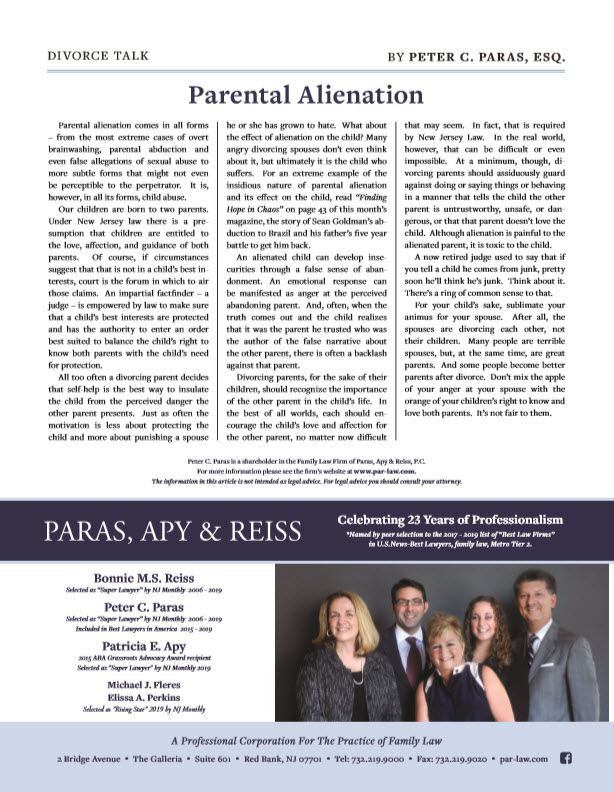Parental alienation comes in all forms – from the most extreme cases of overt brainwashing, parental abduction and even false allegations of sexual abuse to more subtle forms that might not even be perceptible to the perpetrator. It is, however, in all its forms, child abuse.
Our children are born to two parents. Under New Jersey law there is a presumption that children are entitled to the love, affection, and guidance of both parents. Of course, if circumstances suggest that that is not in a child’s best interests, court is the forum in which to air those claims. An impartial factfinder – a judge – is empowered by law to make sure that a child’s best interests are protected and has the authority to enter an order best suited to balance the child’s right to know both parents with the child’s need for protection.
All too often a divorcing parent decides that self-help is the best way to insulate the child from the perceived danger the other parent presents. Just as often the motivation is less about protecting the child and more about punishing a spouse he or she has grown to hate. What about the effect of alienation on the child? Many angry divorcing spouses don’t even think about it, but ultimately it is the child who suffers. For an extreme example of the insidious nature of parental alienation and its effect on the child, read “Finding Hope in Chaos” on page 43 of this month’s magazine, the story of Sean Goldman’s abduction to Brazil and his father’s five year battle to get him back.
An alienated child can develop insecurities through a false sense of abandonment. An emotional response can be manifested as anger at the perceived abandoning parent. And, often, when the truth comes out and the child realizes that it was the parent he trusted who was the author of the false narrative about the other parent, there is often a backlash against that parent.
Divorcing parents, for the sake of their children, should recognize the importance of the other parent in the child’s life. In the best of all worlds, each should encourage the child’s love and affection for the other parent, no matter now difficult that may seem. In fact, that is required by New Jersey Law. In the real world, however, that can be difficult or even impossible. At a minimum, though, divorcing parents should assiduously guard against doing or saying things or behaving in a manner that tells the child the other parent is untrustworthy, unsafe, or dangerous, or that that parent doesn’t love the child. Although alienation is painful to the alienated parent, it is toxic to the child.
A now retired judge used to say that if you tell a child he comes from junk, pretty soon he’ll think he’s junk. Think about it. There’s a ring of common sense to that.
For your child’s sake, sublimate your animus for your spouse. After all, the spouses are divorcing each other, not their children. Many people are terrible spouses, but, at the same time, are great parents. And some people become better parents after divorce. Don’t mix the apple of your anger at your spouse with the orange of your children’s right to know and love both parents. It’s not fair to them.

